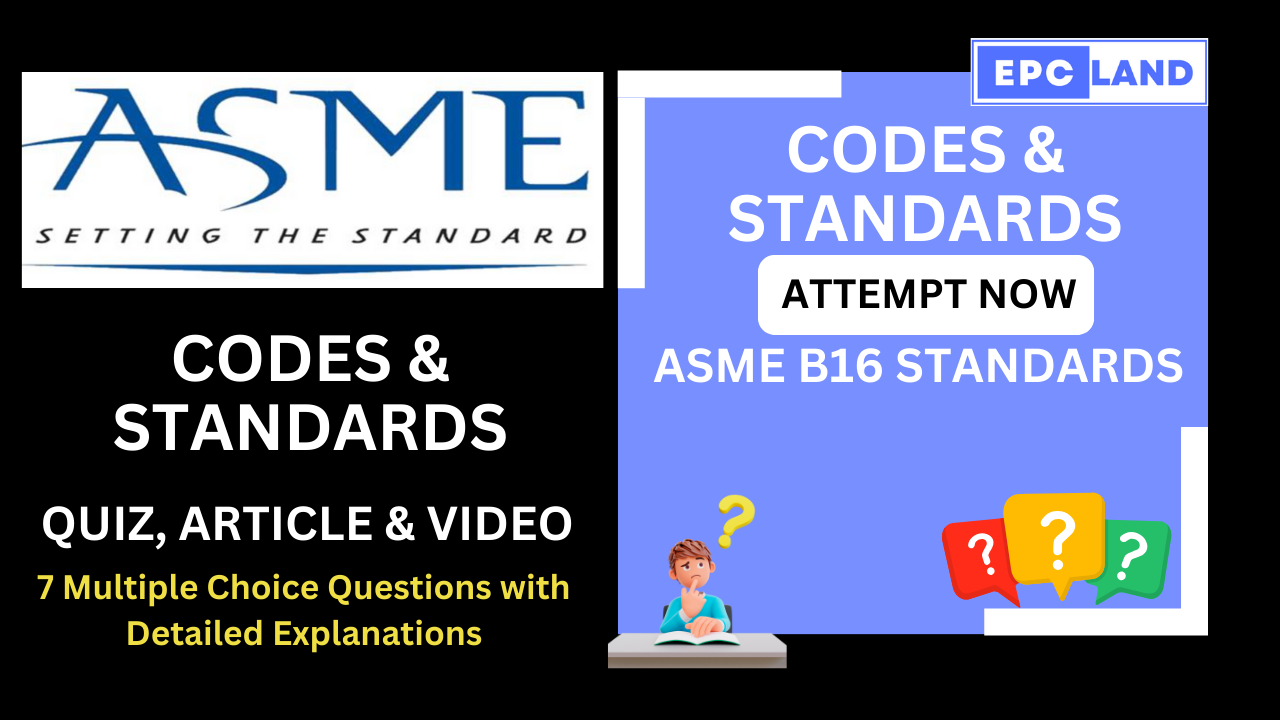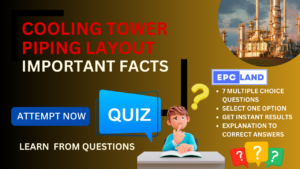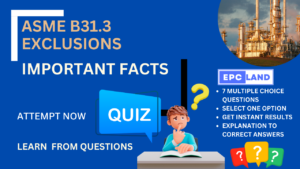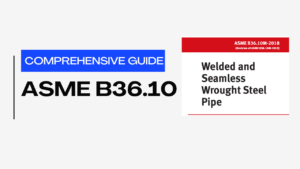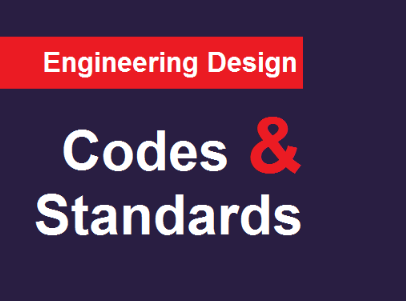
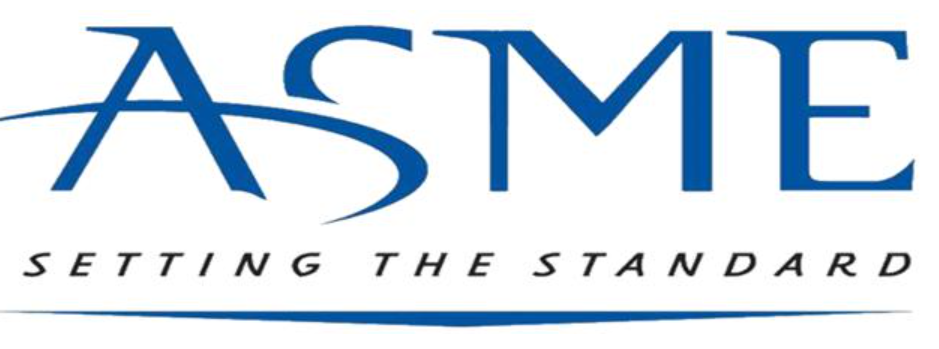
1. B16.10 Standards
What does ASME B16.10 cover?
Explanation: ASME B16.10 covers face-to-face and end-to-end dimensions for valves to ensure interchangeability for specific sizes and ratings.
2. B16.20 Standards
Which type of gaskets for flanges are covered by ASME B16.20?
Explanation: ASME B16.20 covers metallic gaskets for flanges, including ring-joint, spiral-wound, and jacketed types.
3. B16.34 Standards
What does ASME B16.34 cover?
Explanation: ASME B16.34 covers flanged, threaded, and welding end valves, providing specifications for pressure-temperature ratings, dimensions, materials, and testing.
4. B16.48 Standards
What does ASME B16.48 cover?
Explanation: ASME B16.48 covers line blanks for installation between flanges, specifying pressure-temperature ratings, materials, dimensions, and testing.
5. B1.20.1 and B1.20.2M Standards
What do B1.20.1 and B1.20.2M cover?
Explanation: B1.20.1 and B1.20.2M cover pipe threads for general purpose applications, providing standards for inch and metric versions, respectively.
6. B36.10M and B36.19M Standards
What do B36.10M and B36.19M cover?
Explanation: B36.10M and B36.19M cover welded and seamless wrought steel pipe and stainless steel pipe, respectively, with standardized dimensions.
7. PCC-1 Standards
What does PCC-1 cover?
Explanation: PCC-1 covers guidelines for pressure boundary bolted flange joint assembly, providing procedures for safe and effective flange connection.
25+ Relevant topics on Codes & Standards
Short Article on Codes & Standards

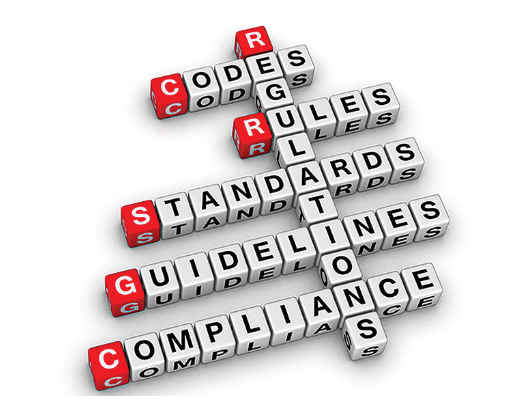
A Quick Guide to ASME B16 Standards for Piping Components
This document provides a concise overview of key ASME B16 standards relevant to piping components.
Focus:
- Face-to-face and end-to-end dimensions: B16.10, B16.11, B16.34
- Flanges and flanged fittings: B16.5, B16.47
- Buttwelding fittings and ends: B16.9, B16.25
- Gaskets for flanges: B16.20, B16.21
- Line blanks: B16.48
- Pipe threads: B1.20.1, B1.20.2M
- Welded and seamless pipe: B36.10M, B36.19M
- Bolted flange joint assembly: PCC-1
Key Points:
- B16.10: Face-to-face and end-to-end dimensions for valves, ensuring interchangeability for specific sizes and ratings.
- B16.11: Socket welding and threaded forged fittings, with pressure ratings and dimensional specifications.
- B16.20: Metallic gaskets for flanges, including ring-joint, spiral-wound, and jacketed types.
- B16.21: Nonmetallic flat gaskets for flanges, with diverse types and dimensional requirements.
- B16.25: Preparation of buttwelding ends for piping components, including bevels, shaping, and internal end preparation.
- B16.34: Flanged, threaded, and welding end valves, covering pressure-temperature ratings, dimensions, materials, and testing.
- B16.47: Large diameter steel flanges (NPS 26-60), with pressure-temperature ratings, materials, dimensions, and testing requirements.
- B16.48: Line blanks for installation between flanges, with pressure-temperature ratings, materials, dimensions, and testing specifications.
- B1.20.1 and B1.20.2M: Pipe threads for general purpose applications, in inch and metric versions.
- B36.10M and B36.19M: Welded and seamless wrought steel pipe and stainless steel pipe, respectively, with standardized dimensions.
- PCC-1: Guidelines for pressure boundary bolted flange joint assembly, providing procedures for safe and effective flange connection.
Remember:
- These are just some of the many B16 standards available.
- Always consult the relevant standard for specific details and requirements.
- Choosing the correct standard ensures compatibility, safety, and performance in your piping system.
I hope this summary proves helpful!
Table of Contents
Don’t miss the Course on Effective Isometrics Management: Check Now
Enrollment Link
Recommended courses (Published on EPCLand)
- Complete Course on Piping Engineering
- Basics of Piping Engineering
- Piping Layout Engineering
- Piping Material Engineering
- Piping Stress Analysis
- Material Requisitions
- Piping Material Specifications
- Valve Material Specifications
- Plant Design & Layouts-OISD 118
- Isometric Management
Library of Technical Articles
Don’t miss out the collection of 15+ articles on following topics:
- Basics of Oil and Gas Industry
- Valves
- Testing
- Tank
- Piping Bulk Items
- Pipe
- Metallurgy
- Piping Materials
- Layout
- Instrumentation
- Heat Exchanger
- Type of Contracts
- Codes and Standards
- ASTM Standards
- Articles on Piping Specialty Items
Video details of Complete Course on Piping Engineering
Why Enroll in the EPCLand
Proven Track Record– PTR
Activities & Achievements before launching EPCLand
- Published more than 50+ short courses
- 3000+ Enrolments
- More than 3,500,00 Minutes of watch hours in the last 2 years
- 4000+ Students in 100+ Countries
- Rating of 4+ out of 5
- 1000+ YouTube Videos
- 8K+ Subscribers
What Students will Learn
- Codes & Standards of the Energy Sector
- Piping Material Engineering
- Piping Layout Engineering
- Stress Analysis
Interesting facts
- All the published courses have been developed by Industry Experts with more than 2 decades of experience
- Content is based on Practical experience and real-time problems.
- Content is designed and organized in such a manner that it can be easily grabbed.
- Complete website, Blogs and Quiz sections are Planned, Designed and published by myself (About me: Atul Singla)
- Complete flexibility of Time & Location, Students can access the content from anywhere & anytime
- Moreover, once enrolled, the content can be access as many times as you want, which helps in understand the fundamentals in a better way.
Conclusion
In conclusion, our courses are meticulously crafted by industry experts with over two decades of hands-on experience. The content is rooted in practical knowledge, addressing real-time problems. The material is thoughtfully designed and organized for easy comprehension. Every aspect, from the website to blogs and quizzes, has been planned, designed, and executed by Atul Singla, ensuring a comprehensive and seamless learning experience. With the flexibility of accessing the content at any time and from any location, students have the freedom to learn on their terms. Furthermore, enrollment grants unlimited access, allowing learners to revisit the material as often as needed, fostering a deep understanding of the fundamentals.
